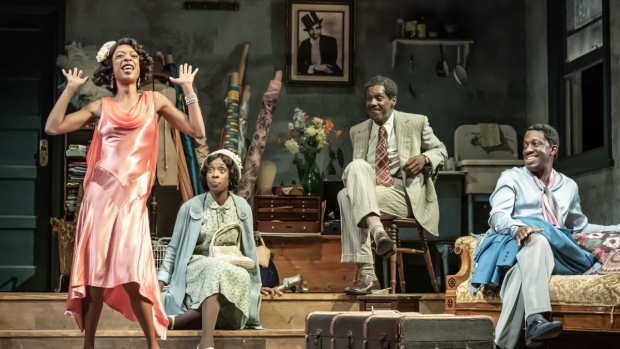”Blues for an Alabama Sky” at the National Theatre – review

© Marc Brenner
There’s something of Chekov in Pearl Cleage’s Blues for An Alabama Sky. But there’s also something of Friends. Written in 1995 but set at the time of the Harlem Renaissance in the 1930s, it focuses on a group of friends who live in adjoining rooms, their front doors always open to each other. Its supreme achievement is to make you care deeply about those people.
I’ve rarely seen a play in which the imprint of identification and affection for the protagonists is so strong and so involving. It’s a work that makes you want to lean in, holding your breath as their fortunes shift and stir, hoping for the best but somehow always fearing the worst.
At some levels, it’s quite a small, detailed piece of writing, but Lynette Linton gives it a magnificently large and soaring production, emphasising both its humour and the seriousness of its themes. Frankie Bradshaw provides a solid rooming house set, with central steps and fire escapes vanishing upwards into the sky. We first meet the singer Angel (Samira Wiley, of Handmaid’s Tale and Orange is the New Black), as she staggers home drunkenly, her legs collapsing under her like a inebriated gazelle, after being dumped by her Italian gangster boyfriend – and losing her job when she stepped out of the chorus line to berate him.
She’s supported both by her best friend Guy (Giles Terera),a flamboyantly gay costume designer and by Leland (Osy Ikhile) an upright, uptight stranger from Alabama, who thinks Angel is the spitting image of his dead wife.
There’s a beautiful energy in the unfolding of these early scenes, bolstered by the arrival of Guy’s neighbour Delia (Ronke Adékoluẹjo), an idealistic, church-going woman who believes that birth control will help Black women have power over their lives, and Sam (Sule Rimi), a doctor whose simultaneous care for the community and love of partying means he is so tired he falls asleep in the middle of every conversation. “I don’t want to work so hard on the body I forget my soul,” he says.
Their conversation is funny and vital, their movement loose and full of dance; there’s a wonderful moment early on when Delia asks Guy whether he believes she is brave enough to speak up for her vision. “Nerve to spare,” he replies, throwing up his arm in a fierce arc. She mimics him, more tentatively but with conviction. It’s a gesture that helps you understand them both. They are all pursuing their ambitions and their belief in a new freedom even as the Depression and prejudice threaten their ability to achieve them.
Guy’s dream is one of leaving: he’s off to Paris to make costumes for Josephine Baker who is taking the city by storm. Angel doubts it can come true. “I’m tired of negro dreams. All they ever do is break your heart.” She settles for courtship from Leland, whose ultra conservative views threaten the life the quartet are trying to forge.
Linton bolsters the theme of aspiration with composer Benjamin Kwasi Burrell’s setting of poems by Langston Hughes – a key voice in Harlem at the time and an off-stage presence here. But that framing, beautiful though it is under Oliver Fenwick’s luscious lighting, can’t disguise the fact that the development of the story is too predictable.
The evening sustains itself with performances that sweep you away. Wiley, making her London stage debut, is an enticing mixture of vulnerable and selfish as Angel, frightened and assured, beautiful and ugly. Terera pulls off a similar feat; his timing as Guy is a master class in humour – his expression when he looks at Delia’s suit is a joy – yet he also suggests the character’s toughness, his ability to fight for his right to be different and his willingness to help Angel do the same. Ikhile does his best with a difficult part, eliciting sympathy as well as horror.
Yet the heart of the production lies in the developing relationship between Adékoluẹjo’s Delia and Rimi’s Sam. She is a revelation, all fluttery nerves that gradually recede to show the steel and the compassion beneath; he is equally powerful, with a luminous grace and intelligence, a man lit from within by the possibility of happiness.
It’s the triumph of the production that you really believe in all these people and believe that they are friends. It has a humanity that provokes profound emotion.










